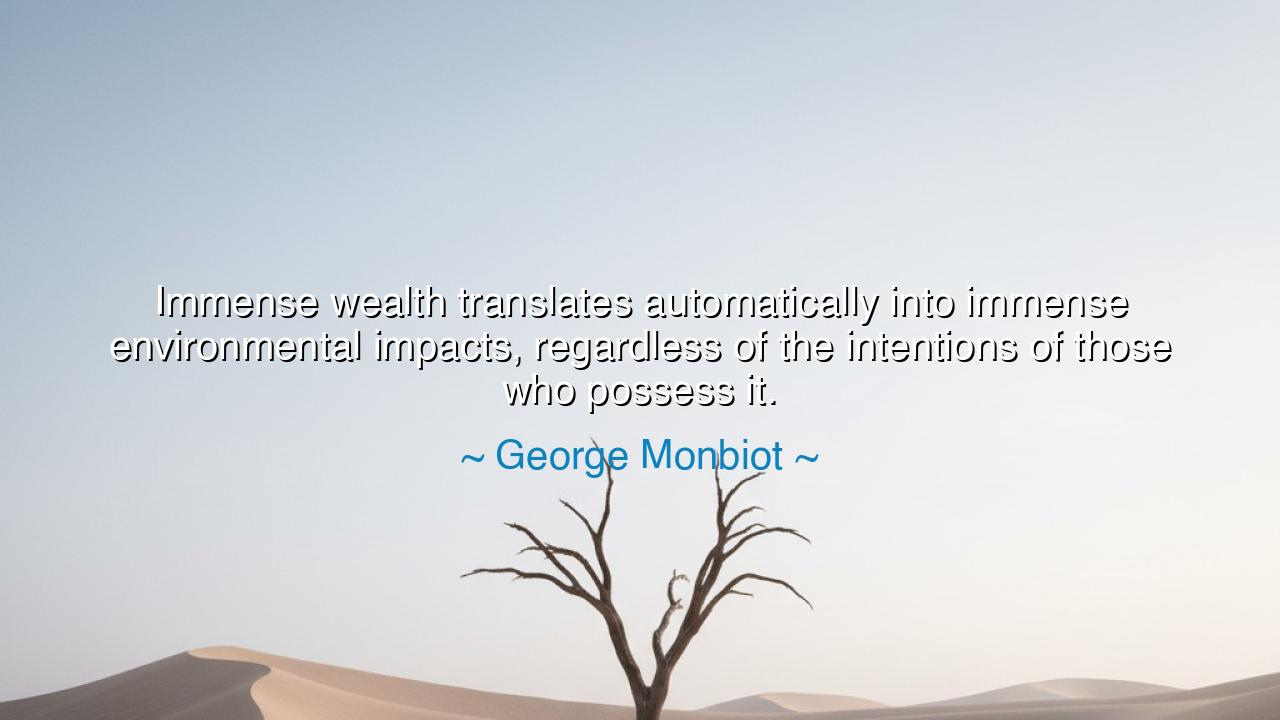
Immense wealth translates automatically into immense
Immense wealth translates automatically into immense environmental impacts, regardless of the intentions of those who possess it.






Hear, O children of earth, the words of George Monbiot: “Immense wealth translates automatically into immense environmental impacts, regardless of the intentions of those who possess it.” In these words is a truth sharp as a blade and heavy as a stone: that wealth, though sought by many as the crown of life, often carries with it a shadow that falls upon the forests, the rivers, the seas, and the skies. For wealth is power, and power draws from the earth’s body—its minerals, its waters, its creatures. Thus, no matter how noble the heart of the wealthy, their footprint upon creation grows heavier simply by the scale of what they command.
The ancients knew this lesson. Kingdoms of old flourished with gold and silver, but the cost was always borne by the land and its people. The mines of Potosí in South America, once called the mountain of silver, enriched empires across the sea, but the mountain itself was gutted, its workers enslaved, and its earth left in ruin. Here we see Monbiot’s warning made flesh: immense wealth was forged, but the environmental impact was immense also, regardless of any intent to do good. Wealth cannot be gathered on such a scale without reshaping the world itself, often in ways that wound it deeply.
Consider also the age of industrial revolution, when fortunes were made in coal, steel, and machines. Cities gleamed with prosperity, but the skies blackened with soot, rivers ran poisoned, and forests fell in endless procession. The wealthy industrialists might not have wished to harm the world; many even built libraries, schools, and charities. Yet still their wealth was bought at the price of the earth’s breath. So Monbiot speaks truth: intentions are not enough, for the scale of wealth itself multiplies harm, dragging the environment into sacrifice for human gain.
Yet the quote is not merely a condemnation; it is also a call to wisdom. For if wealth and power inevitably enlarge our impact, then those who hold them must bear greater responsibility. To command much is to owe much—to the earth as well as to humanity. The wealthy cannot excuse themselves by saying, “I did not intend harm,” for harm flows naturally from their vast consumption and reach. Thus, the greater the wealth, the greater the duty to tread lightly, to restore what is taken, to innovate ways that lessen the burden upon creation.
The origin of Monbiot’s words lies in his lifelong labor as a critic of unsustainable growth and inequality. He has seen that the richest nations and the richest individuals consume resources far beyond their share, while the poor, though they often live lightly upon the earth, suffer most from the destruction caused by others. The lesson here is not only ecological but moral: that imbalance in wealth creates imbalance in the environment, and both together corrode justice.
The lesson for future generations is this: do not be blinded by the shining face of riches. Look also to the shadow they cast. A single palace may devour the resources of a village; a single yacht may drink the fuel of a thousand homes; a single fortune may drive the cutting of forests, the dredging of seas, the warming of skies. If you desire wealth, desire it not for vanity, but for stewardship—to heal more than you harm, to give more than you take.
Practical action lies before us: hold the powerful accountable for their impacts, regardless of intent. Demand that corporations, governments, and individuals of great wealth measure their success not by profit alone but by the health of the earth they leave behind. And in your own life, remember that though your footprint may be smaller, your choices matter. Live simply, act justly, and support systems that reward sustainability rather than excess.
So let it be remembered: immense wealth is not neutral. It is a fire that consumes, whether gently or fiercely. Only when tempered with humility and responsibility can it warm rather than destroy. Let those who rise to great fortune remember this truth, lest their legacy be not prosperity, but ruin written upon the earth itself.






AAdministratorAdministrator
Welcome, honored guests. Please leave a comment, we will respond soon